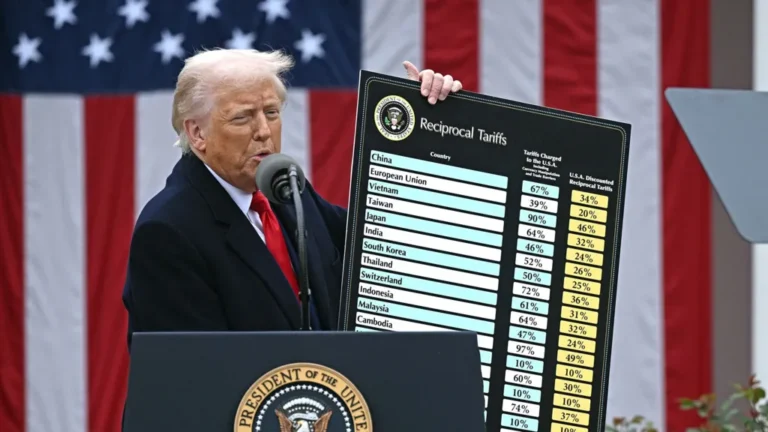In a major escalation of the U.S.-China trade conflict, China announced a 34% tariff on all U.S. imports on Friday, just two days after President Donald Trump imposed identical tariffs on all Chinese goods.
This retaliatory move raises the total tariff burden on Chinese imports to at least 54%, due to a previous 20% levy enacted earlier this year. The Trump administration calls it a reciprocal measure against trade partners who allegedly exploit the U.S. economy.
🔗 Also Read: The Polarization of Politics: Understanding the Causes and Consequences of a Divided Society
China’s Response and Global Ramifications
In a strong rebuttal, the Chinese Ministry of Finance condemned the new tariffs, labeling them as a “typical act of unilateral bullying” that violates international trade law and endangers global economic stability and supply chains.
Beijing also:
- Filed a complaint with the World Trade Organization (WTO) against the U.S.
- Banned 11 American firms by adding them to its “unreliable entities” list.
- Launched anti-dumping investigations into medical CT X-ray tubes from the U.S. and India.
- Introduced export controls on strategic rare earths like samarium, gadolinium, and yttrium.
🔗 Recommended: The Role of Social Media in Modern Political Campaigns: A Double-Edged Sword
🔗 Also Read: Meta Ditches Fact-Checkers – What Impact on Facebook and Instagram?
Markets React as Fears of Global Recession Grow
The impact was immediate: U.S. stock futures and European markets fell sharply following Beijing’s announcement. Economists warn the escalating trade war could disrupt supply chains, raise consumer prices, and strain diplomatic relations.
“Trump’s tariffs are his biggest gamble yet,” analysts at Wall Street Journal wrote, highlighting the risks of using trade as a foreign policy weapon.
🔗 Explore More: Scott Bessent to Divest $700M in Assets to Avoid Conflicts as Treasury Pick
A Calculated Political Strategy?
Some experts argue that these tariffs serve not just economic purposes but political ones, especially as Trump gears up for re-election. By taking a hardline stance, he may be appealing to nationalist sentiments and manufacturing workers.
The trade conflict mirrors deeper shifts in global politics. Read our report on The Impact of Youth Voter Engagement on Political Outcomes
Conclusion
As the world’s two largest economies clash, the consequences are far-reaching. Will diplomacy prevail, or are we heading toward a deeper global trade crisis? The coming weeks could shape the future of economic alliances, supply chain resilience, and global cooperation.
🔗 Insight: The Intersection of Politics and Climate Change: How Policy Decisions Shape Our Planet’s Future
🔗 Read Next: Hush Money Scandals: Ethical and Legal Perspectives


